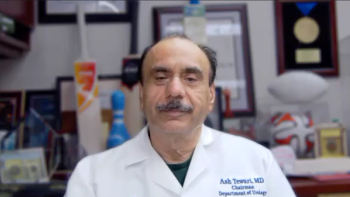
The Future of Metastatic Urothelial Carcinoma Management
Closing out their review of metastatic urothelial carcinoma management, panelists share what they most look forward to in the evolving treatment landscape.
Episodes in this series

Transcript:
Petros Grivas, MD, PhD: I will go around the room quickly for sound bites of what excites you most in the urothelial cancer field. Srikala, you go first.
Srikala Sridhar, MD, MSc, FRCPC: Sure, I think the explosion of new trials and new treatments; this has not been seen before in this disease, and it’s leading to more and more. Clinical trials are becoming an important part, almost standard of care, and I think it’s great.
Petros Grivas, MD, PhD: Clinical trials [are a] standard of care option, I echo that. That’s a great message [for] clinical trials. Cora?
Cora Sternberg, MD, FACP: I agree. I think we’ve seen amazing progress since the days of MVAC [methotrexate, vinblastine sulfate, doxorubicin, and cisplatin] and gemcitabine platinum. We didn’t have anything for years, and now we have a plethora of new agents, and the new HER2 antibody conjugates could be very interesting too. I do agree with the idea of putting patients in clinical trials whenever possible too.
Petros Grivas, MD, PhD: Very exciting, that’s what we do every day. Tian?
Tian Zhang, MD, MHS: I think with the enfortumab vedotin and pembrolizumab combination and the EV-302 trial enrolling very well, that’s a combination that might supplant chemotherapy for the first time for the first line for metastatic urothelial carcinoma, and that to me is quite exciting. It’s changing the paradigm of how we treat patients. But also, as we sequence treatments, we are seeing prolonged responses and getting our patients to live longer, and that’s really exciting to me.
Petros Grivas, MD, PhD: Absolutely. Guru?
Guru P. Sonpavde, MD: I agree. I think there’s a lot of excitement behind enfortumab vedotin and pembrolizumab, with survival maybe exceeding 2 years. We don’t know, we need to wait and see the confirmatory data. I also think that in the adjuvant setting, using minimal residual disease, [and] using ctDNA [circulating tumor DNA] assessment is exciting, so that’s something to watch for.
Petros Grivas, MD, PhD: I agree that this is such an exciting time to be in urothelial cancer, and all of you have made so many contributions. Thank you so much, Guru, Srikala, Cora, and Tian for your contributions in the field but also for being here today with me and making me smarter by your presence and your knowledge.
Thanks to the audience of course. This program is brought to you by the CancerNetwork®. We are very excited to have this discussion on urothelial carcinoma. Thank you so much for this interactive discussion, which hopefully was beneficial and informative to the audience. Hopefully, we’ll have more data in the future to help you inform your clinical practice. Thanks for your attention.
Transcript edited for clarity.
Newsletter
Stay up to date on recent advances in the multidisciplinary approach to cancer.








































